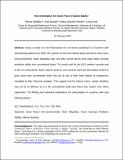Files in this item
How informative are stock prices of Islamic banks?
Item metadata
| dc.contributor.author | Abedifar, Pejman | |
| dc.contributor.author | Bouslah, Kais Ben Hmida | |
| dc.contributor.author | Hashem, Shatha Qamhieh | |
| dc.contributor.author | Song, Liang | |
| dc.date.accessioned | 2021-05-18T23:47:36Z | |
| dc.date.available | 2021-05-18T23:47:36Z | |
| dc.date.issued | 2020-05 | |
| dc.identifier | 263763974 | |
| dc.identifier | 7349b159-7e1e-40d9-a8bd-4071821670fa | |
| dc.identifier | 85085649659 | |
| dc.identifier | 000540314700008 | |
| dc.identifier.citation | Abedifar , P , Bouslah , K B H , Hashem , S Q & Song , L 2020 , ' How informative are stock prices of Islamic banks? ' , Journal of International Financial Markets, Institutions and Money , vol. 66 , 101203 . https://doi.org/10.1016/j.intfin.2020.101203 | en |
| dc.identifier.issn | 1042-4431 | |
| dc.identifier.other | ORCID: /0000-0002-7648-7201/work/74510303 | |
| dc.identifier.other | ORCID: /0000-0001-8407-8929/work/82179582 | |
| dc.identifier.uri | https://hdl.handle.net/10023/23219 | |
| dc.description.abstract | Using a sample of 2,210 observations for 170 banks operating in 12 countries with dual banking systems over 2005–2017 period, we find that Islamic banks have lower stock return non-synchronicity, lower illiquidity ratio, and their current returns have lower future earnings prediction ability than conventional banks. The results hold for the GCC-member countries and in the non-crisis period. Hence, Islamic banks in such countries have less information content in stock prices than conventional banks that can be due to their lower degree of transparency mandated by their financial paradigm. This suggests that for Islamic banks, market discipline may not be as effective as it is for conventional banks and hence they require more direct supervision. The finding has important implications for policymakers in countries with dual banking systems. | |
| dc.format.extent | 17 | |
| dc.format.extent | 598949 | |
| dc.language.iso | eng | |
| dc.relation.ispartof | Journal of International Financial Markets, Institutions and Money | en |
| dc.subject | Stock Return non-synchronicity | en |
| dc.subject | Stock illiquidity | en |
| dc.subject | Future earnings prediction ability | en |
| dc.subject | Islamic banking | en |
| dc.subject | HF Commerce | en |
| dc.subject | 3rd-DAS | en |
| dc.subject.lcc | HF | en |
| dc.title | How informative are stock prices of Islamic banks? | en |
| dc.type | Journal article | en |
| dc.contributor.institution | University of St Andrews. School of Management | en |
| dc.contributor.institution | University of St Andrews. Centre for the Study of Philanthropy & Public Good | en |
| dc.contributor.institution | University of St Andrews. Centre for Responsible Banking and Finance | en |
| dc.identifier.doi | https://doi.org/10.1016/j.intfin.2020.101203 | |
| dc.description.status | Peer reviewed | en |
| dc.date.embargoedUntil | 2021-05-19 |
This item appears in the following Collection(s)
Items in the St Andrews Research Repository are protected by copyright, with all rights reserved, unless otherwise indicated.

